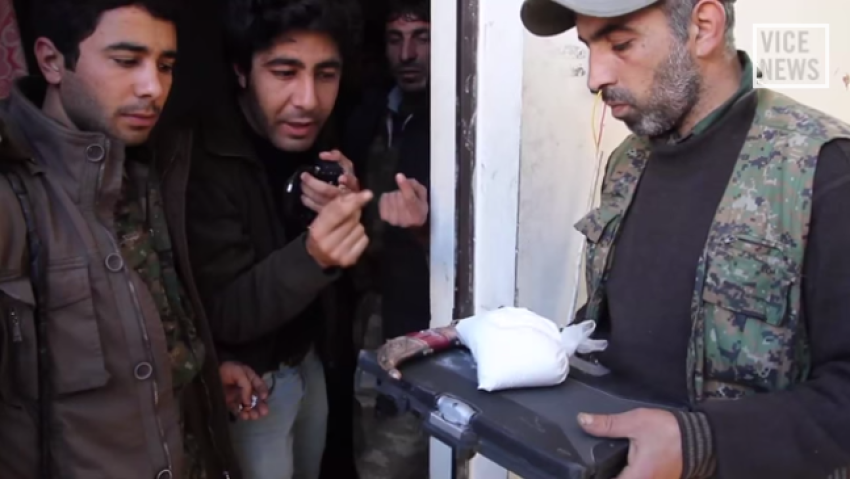Cocaine Found in Slain ISIS Commander's Home Indicates Heavy Drug Use Among Jihadists, Despite Being Violation of Sharia Law

After killing an important ISIS leader in battle, Kurdish forces in Syria found a huge bag of cocaine in the slain commander's home, providing further speculation that militants often use narcotics despite the fact that its police units strictly enforce drug bans inside the group's strongholds.
As Kurdish advancements in Kobane have allowed the People's Protection Unit to push ISIS militants out of about 80 percent of the strategic Syrian border town, key ISIS leader Emir Abu Zahra was killed by the kurds in a recent gun fight.
Vice News' video footage shows that the during the Kurdish unit's subsequent search of Zahra's home in the Botan neighborhood of Kobane, the troops found a huge bag containing a white powdery substance.
With the Kurdish troops uncertain as to what the bag contained, Vice New's journalist Joakim Medin, who was present during the search, wrote that he suspected that bag was filled with cocaine. Medin then dipped a finger into the powder and tasted the substance to confirm.
"It's a big bag of cocaine," Medin wrote. "I must admit, I am familiar with the taste of the drug. … The other guys have no knowledge of this drug or how people use it. It is nothing they have heard of or encountered before."
Front Page Mag reports that judging by the estimated weight of the bag seen in the video and the UN-reported street prices of cocaine in Syria, the amount of cocaine contained in the bag is probably worth about half a million dollars.
The grand quantity of cocaine found in Zahra's home gives reason to believe that the drug was intended to be distributed, to ISIS fighters. According to The Daily Mail, it's believed that Zahra was known to distribute cocaine to ISIS militants to help ease their minds as they face the brunt of U.S.-led coalition aerial bombings.
"With the finding of what seems to be Abu Zahra's cocaine in Kobane, this could be the first confirmed and concrete evidence of drug use among IS fighters — and of a double standard of men who preach fundamentalism, yet they are getting high as they commit massacres," Medin wrote.
Although ISIS is preventing people within its strongholds from using drugs by placing bans on the use of narcotics, alcohol and smoking, Medin reports that Kurdish fighters have said that they found some ISIS fighters to be "drug-crazed" and have also found mysterious pills, capsules, and syringes on living and killed militants.
Some former ISIS fighters have claimed that they were drugged by leaders before battle to help them fight with more bravery, and create more courage for militants to carry out suicide attacks. A 15-year-old who claimed to have been forced into joining the jihadists' ranks alleged that he was personally given an anti-anxiety medicine, similar to Zolam, and then given a suicide belt before going into battle.
"That drug makes you lose your mind," the 15-year-old told CBS News. "If they give you a suicide belt and tell you to blow yourself up, you'll do it."
The prevalent drug use by the ISIS militants contradicts their religious police forces' imposition of harsh punishments for non-militants caught using drugs in the caliphate.
A previous ISIS propaganda video showed militants whipping three drug users near the Syrian town of Damascus. One person who was caught smoking in Raqqa told Al-Monitor that he was punished for smoking by having all of his fingers broken by a militant, who bent his fingers back and forth with a set of pliers.



























